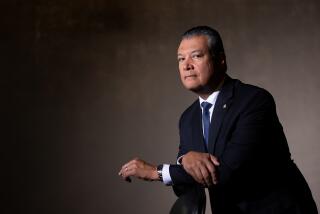Defense Attacks Government Evidence in Terrorism Case
- Share via
WASHINGTON — In her strongest challenge yet to the government’s case, the attorney for Jose Padilla, the “dirty bomb” plot suspect, said Tuesday that the American-born captive is not a terrorist and “has no information to provide” military interrogators.
Donna R. Newman, a New York lawyer who is seeking to meet with her client, also alleged that authorities are merely engaged in “foot dragging” in trying to keep her from fashioning a defense that might get him released if prosecutors never file criminal charges.
“Although the government presents facts showing Padilla had contact with and was acting on behalf of Al Qaeda, there is nothing to indicate that Padilla in particular was trained to transmit information in the way the government suggests, or that he had information to transmit,” she said in a court filing in New York.
She and prosecutors are to meet today with U.S. District Judge Michael Mukasey to sort out their differences about whether the attorney-client meeting should be held.
Last month, the judge ruled that while Padilla’s open-ended lockdown in a military brig in South Carolina is lawful, he still has the right to confer with his lawyer and mount a legal challenge asking the court to order the government to either charge him with a crime or set him free.
But last week, prosecutors asked the judge to reconsider that ruling, saying that any meeting with a lawyer would hamper their efforts to build some trust with Padilla and glean crucial information from him that might help the U.S. war on terrorism.
Indeed, prosecutors asserted, more than 100 terrorist threats have been thwarted by information picked up in interrogations with numerous captives since the Sept. 11 attacks on the World Trade Center and the Pentagon.
As for Padilla, they assessed his “potential intelligence value as very high,” but did not state whether the 32-year-old Brooklyn native, who was reared in Chicago, has in fact given the government any worthwhile information.
That was the point Newman said she was seeking to make: that Padilla has no intelligence to pass on to U.S. authorities because he is not a terrorist.
She said the prosecution’s position “consists of nothing more than conjecture as to what Padilla is thinking and how he might react to seeing” her in a meeting in South Carolina.
She has told authorities that she might need up to five days to go over the case with her client, and possibly even discuss what interrogators are asking him.
She noted that he was arrested in May in Chicago, after flying there from Pakistan where the government contends that he had met with Al Qaeda operatives and was sent here to scout for targets and material for a radioactive bomb.
In June, President Bush declared Padilla an enemy combatant and he was dispatched to the brig in South Carolina, where he has remained incommunicado.
“Seven months have elapsed since Padilla was transferred to the military,” Newman said.
Yet, she said, the government has never revealed that a trusting relationship has indeed developed between Padilla and his captors.
Rather, she pointed out, authorities merely “speculate” that he “could” or “may potentially have” information to help the U.S.
She added that any names that Padilla could give to authorities for arrests would be long gone anyway.
“It is unimaginable that any potential evildoer who dealt with Padilla or who expected to deal with Padilla would remain in place in face of the ... media blitz that followed Padilla’s transfer to the military,” Newman said.
She added: “Inasmuch as Padilla is reported to be no more than a small fish by agents involved in his interrogation, [the] supposition that Padilla is a potential source of highly sensitive information is disingenuous conjecture.”
More to Read
Sign up for Essential California
The most important California stories and recommendations in your inbox every morning.
You may occasionally receive promotional content from the Los Angeles Times.













